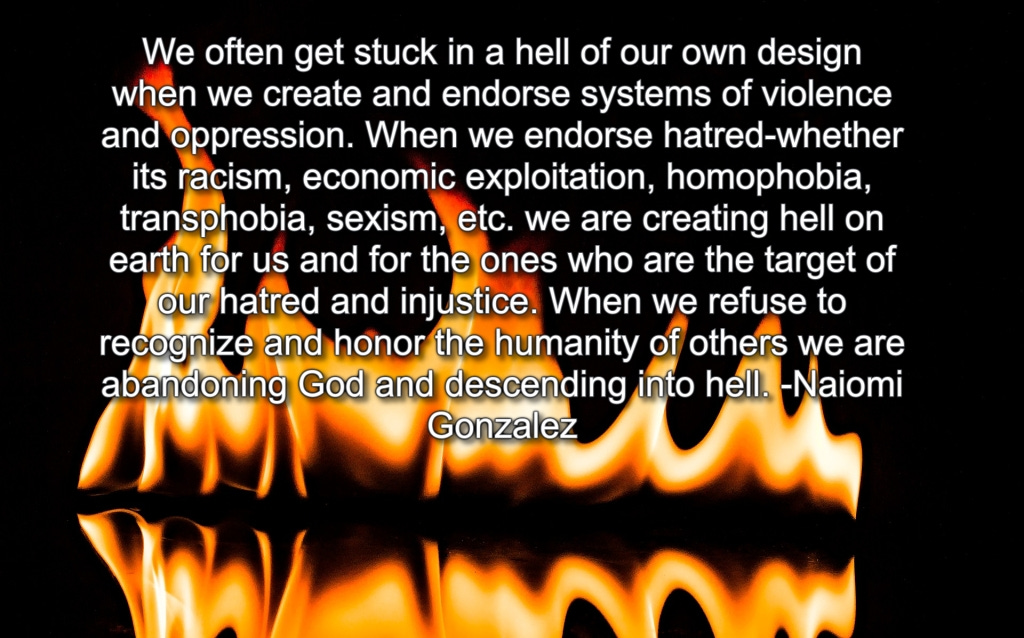Fourth Sunday of Advent: Love and Hell
I believe in God, the Father almighty,
creator of heaven and earth.
I believe in Jesus Christ, his only Son, our Lord,
who was conceived by the Holy Spirit
and born of the virgin Mary.
He suffered under Pontius Pilate,
was crucified, died, and was buried;
he descended to hell.
The third day he rose again from the dead.
He ascended to heaven
and is seated at the right hand of God the Father almighty.
From there he will come to judge the living and the dead.
I believe in the Holy Spirit,
the holy catholic* church,
the communion of saints,
the forgiveness of sins,
the resurrection of the body,
and the life everlasting. Amen.
*that is, the true Christian church of all times and all place
The Apostle’s Creed, formulated to affirm key points of Christian theology, after centuries of theological debates which sometimes turned bloody and violent, has an interesting sentence that many Protestants tend to overlook. The sentence in question says: “He suffered under Pontius Pilate, was crucified, died, and was buried; he descended to hell.” In other versions the phrase is translated as, “he descended to the dead.”
To be honest, the translation “he descended to the dead” might be more accurate, especially since the idea of hell has been especially contentious in Christian theology and its Biblical origins is up for debate. In fact, hell as we often imagine it: as a place a of eternal fire and torment, was most likely not what many Biblical writers had in mind.
And I am going to say something that should shock absolutely no one who knows me or who has followed my blog for any amount of time: I do not believe in a literal, fire and brimstone hell. I think the idea of hell as a physical place of torment is a theological invention that occurred long after Jesus’ life and death.
Yet, I do not think we need to discard the phrase, “he descended to hell” from translations of The Apostle’s Creed. Instead, we can engage in creative reinterpretation. (To be sure, those who crafted The Apostle’s Creed would probably condemn such a reinterpretation as heretical…but in my case-the heresy train has long ago left the station).
There are numerous reasons why I reject the idea of a physical hell. In addition to dubious theological and Biblical origins, the idea of a physical hell, seems antithetical to the idea of a loving God. Especially the idea of hell I grew up with as a child, where anyone could be condemned to an eternity of suffering, including young teenagers. (My church believed young children would be spared because they could not consciously reject God or choose to disobey God. But I know there are some Christians/denominations, who would condemn even children to hell).
As an adult, when I think of hell, I think less of a physical place and more of a state of being. I imagine it as physical, emotional, and spiritual separation from God. And this type of separation need not occur in the afterlife. It often occurs in the here and now. Not because God abandons us or punishes us, but because we often decide to abandon God.
We often get stuck in a hell of our own design when we create and endorse systems of violence and oppression. When we endorse hatred-whether its racism, economic exploitation, homophobia, transphobia, sexism, etc. we are creating hell on earth for us and for the ones who are the target of our hatred and injustice. When we refuse to recognize and honor the humanity of others we are abandoning God and descending into hell.
This definition of hell means taking the phrase from The Apostle’s Creed and interpreting it in a more metaphorical way. Instead of believing that Jesus died and literally chilled in hell for a few days before resurrecting, I view this phrase as affirming that God through Jesus, never abandons us. God’s love is demonstrated to us not by condemning us to hell, but by journeying through hell with us.
In Advent we acknowledge and celebrate God’s love for us: a love revealed to us by God’s willingness to get physically involved in this mess of a life. We aren’t just celebrating the birth of a random baby next week. (Though I do think babies are adorable and they all should be celebrated) but we are celebrating the act of God physically becoming a part of humanity and participating in this beautiful, confusing, and yes, occasionally hellish experience known as life.
The phrase, in The Apostle’s Creed about Jesus descending into hell, reaffirms what we celebrate during Advent and Christmas: that God’s love knows no bounds. God’s love inspired God to take human form via Jesus and God’s love accompanies us through the darkest and most painful moments of our lives. God accompanies us through hell.



